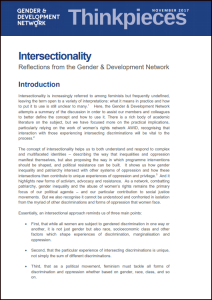Intersectionality: Reflections from the Gender & Development Network
This thinkpiece describes the concept of intersectionality as helping one to both understand and respond to complex and multifaceted identities. It describes the way that inequalities and oppression manifest themselves, but also proposes the way in which program interventions should be shaped, and political resistance can be built.
The piece explains how intersectionality points out how gender inequality and patriarchy intersect with other systems of oppression and how these intersections then contribute to unique experiences of oppression and privilege.
Essentially, an intersectional approach reminds us of three main points:
- First, that while all women are subject to gendered discrimination in one way or another, it is not just gender but also race, socioeconomic class and other factors which shape experiences of discrimination, marginalisation and oppression
- Second, that the particular experience of intersecting discriminations is unique, not simply the sum of different discriminations
- Third, that as a political movement, feminism must tackle all forms of discrimination and oppression whether based on gender, race, class, and so on
Last modified: June 3, 2021
Language: English

